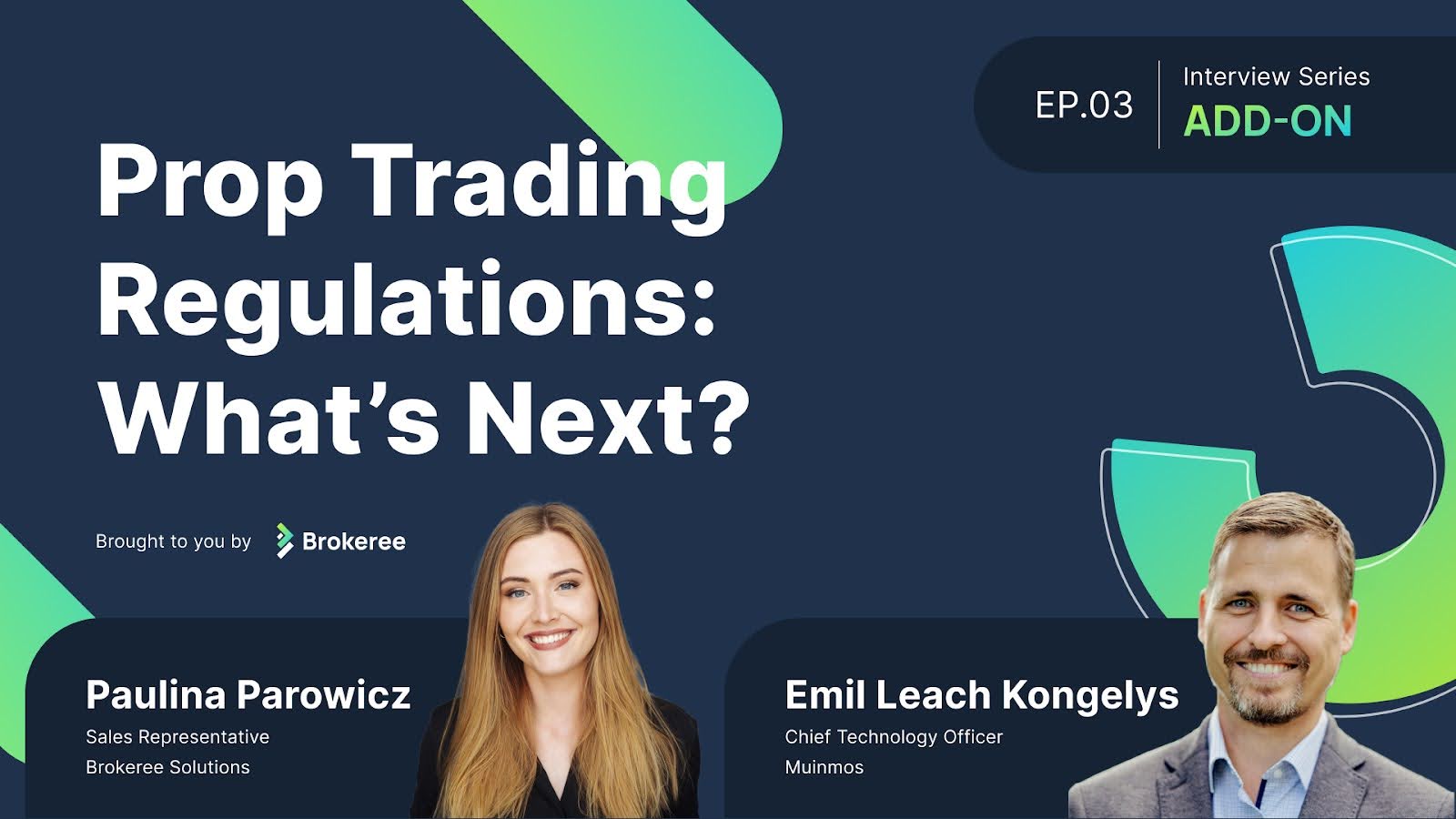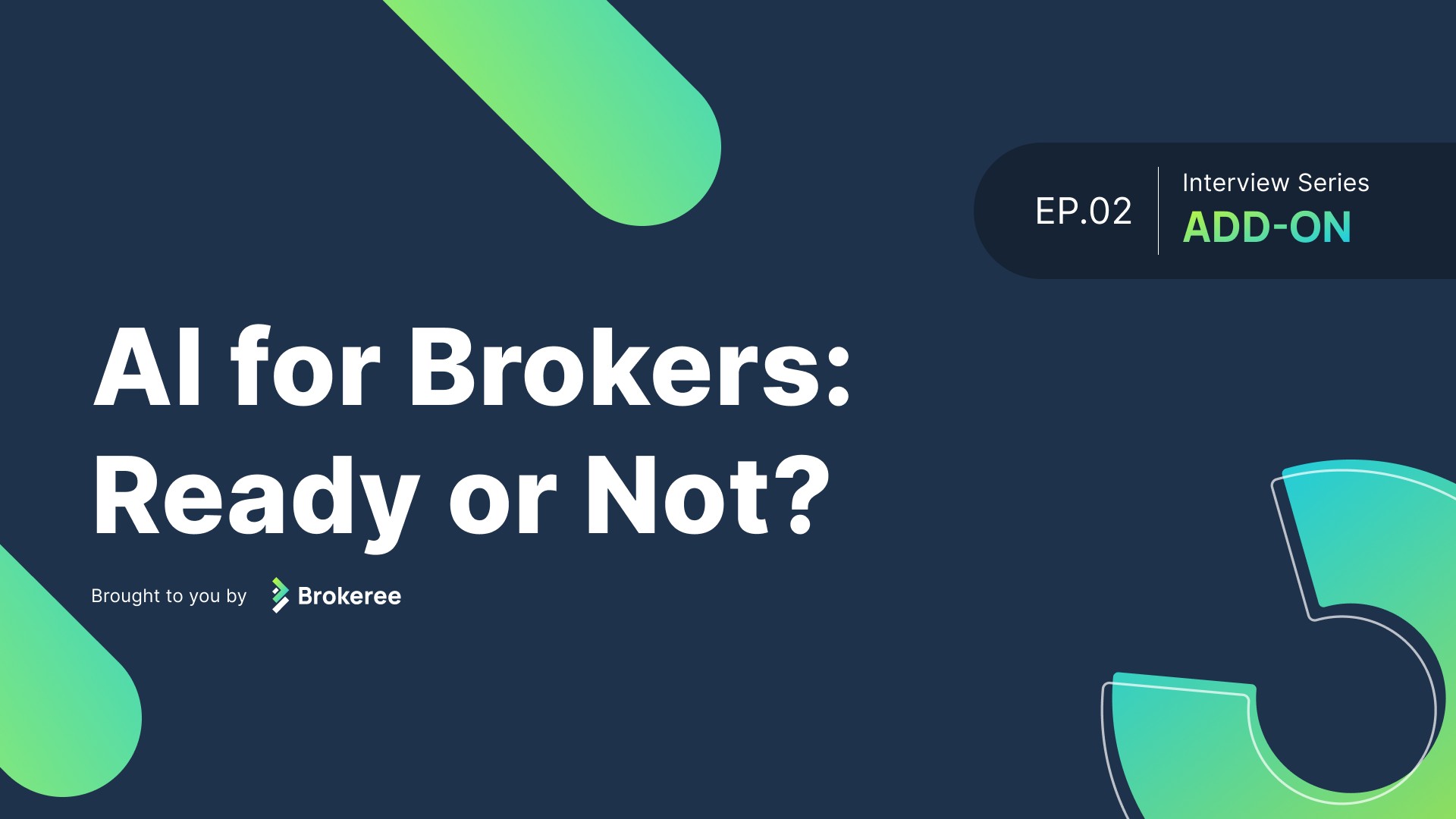Prop trading is a hot topic that keeps evolving in front of our eyes, yet it still keeps raising questions. Even though it holds tremendous potential, this area is somehow surrounded by questions, doubts, and concerns, mainly when it comes to the regulatory and compliance matters.
We believe it is crucial for brokers to operate in alignment with the regulatory requirements as it ensures safety for all stakeholders throughout the trading process.
In the latest episode of the Brokeree Add-On Interview Series, Paulina Parowicz (Brokeree Solutions) had the chance to speak with Emil Kongelys ( Muinmos), and discuss some of the most pressing topics in fintech today—prop trading and regulatory changes surrounding it.
In these extended notes we have summarised the key messages and insights shared by E.Kognelys addressing the regulatory matters in prop trading and trading sector in general. Read more below or for full conversation head to our YouTube Channel.

What’s new in the regulation landscape?
Regulations have become increasingly tight compared to 20 years ago. Rules now cover leverage limits, reporting obligations, and KYC/AML. These measures aim to protect clients and ensure greater market transparency.
The pace itself hasn’t necessarily accelerated—it often appears faster because multiple long-in-the-making regulations are being introduced at once. For example, copy trading existed for decades before it was formally regulated.
What are some of the current regulatory challenges from the regulator’s perspective?
Regulators struggle to keep pace with innovation in financial products, as they aren’t domain experts. This creates a lag between industry innovation and regulation, but institutions can use this lag time to prepare for likely future requirements.
What regulatory changes can be foreseen?
Prop trading would likely be categorized as “dealing on own account,” requiring specific licenses. In this case, greater transparency -may be mandated, especially in trade reporting. Regulators may even start targeting individual prop traders, not just firms.
Is there fear and uncertainty in the industry around regulation?
Fear and uncertainty do exist around regulation-related topics, but it’s often unnecessary. By studying how other products (like copy trading) were regulated, firms can predict and prepare. For example, if MiFID III were to be announced in the future, who knows, it might explicitly address prop trading.
What’s the general take on prop trading as a tool?
Prop trading offers strong benefits such as higher leverage and broader market access. It can provide traders with opportunities that wouldn’t otherwise be available. With proper technical controls and compliance solutions, it is a powerful tool for brokers to adopt.
What is the current regulatory status of prop trading?
It’s largely a gray zone. While firms themselves must comply with existing licenses, their traders operate within less clear rules. Despite this, prop trading is legitimate, and regulators are unlikely to prohibit it outright. Instead, requirements around capital adequacy, leverage limits, and trade reporting could be expected.
Has there been any progress in regulation for prop trading?
Direct progress has not been made; much remains in talks. While discussions are ongoing, formal regulations are still in development. Lessons can be drawn from the U.S., where banks face restrictions, but brokers do not yet.
How should brokers and prop firms prepare?
Firms must be technically advanced, with proper tools capable of handling high trade volumes. Risk management is crucial—ensuring prop traders can’t harm themselves, other clients or the firm itself. Partnerships with trustworthy providers like Muinmos (for KYC/AML) and Brokeree (for trading risk controls) are key.
What role do technology providers play?
Tech providers must deliver tools that help brokers assess traders’ performance and ensure safe operations. Poor tooling can be riskier than trading itself, so selecting trusted, market-tested solutions is critical.
How can firms comply with KYC/AML for prop traders?
KYC/AML checks are non-negotiable, even if traders operate on the firm’s capital. Firms still receive money (through deposits or fees), so knowing the source of funds is essential.
How should firms structure risk management to pass audits?
Documentation must be clear on processes for deposits, withdrawals, and trading behavior. Equally important are technical tools that enforce these rules and monitor evolving trading strategies.
How can brokers prepare for risks like license revocation of a platform provider?
- Always have a backup solution.
- Stay ahead of regulations.
- Monitor changes in key markets.
- Partner with trusted providers who ensure compliance.
What’s the vision for the future of prop trading regulation?
Regulation will likely legitimize prop trading rather than prohibit it.
Once a clear framework is established, both brokers and traders will benefit from greater trust and clarity in the market. Early adopters of compliance will gain a competitive advantage.
In Conclusion:
- Regulation is tightening across the industry, but firms can use historical patterns to predict future requirements.
- Prop trading still holds some, so to say, gray zones, but the expectation is that regulation will eventually formalize it without banning it.
- Preparation is key—brokers must invest in robust risk management, transparency, and compliance tools.
- Technology providers play a critical role in safeguarding firms and traders from both operational and compliance risks.
- Firms that embrace compliance early will be better positioned when regulations arrive.
Watch the full episode of the Brokeree Add-On Interview Series with Emil Kongelys, CTO at Muinmos.
Curious to learn more?
Don’t forget to subscribe to our channel for more insights on the latest fintech innovations. Watch the full episode of Brokeree’s Add-on Series on YouTube for the complete conversation, real-world examples, and expert tips!
About the guest: Emil Kongelys, CTO | Muinmos
Emil Kongelys is a pioneering force at the heart of the fintech revolution, with a remarkable journey that weaves over two decades of innovation, leadership, and transformative impacts across the financial technology landscape. His career, which includes a significant tenure at Finalto (formerly CFH Clearing) and has now evolved into a visionary role at Muinmos, with a relentless pursuit of excellence and change and as part of the Leadership Team. As the driving force behind Muinmos’ Regulatory Onboarding Engine, Emil is not merely participating in the future of RegTech; he is actively crafting it, ensuring onboarding in the global financial ecosystem becomes more streamlined, accessible, and secure. This mission has positioned him as a catalyst for revolutionizing financial services and onboarding.




